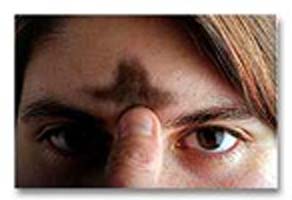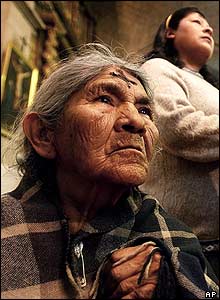
Of course, following yesterday's post, what else could today's title be?
Today I went to my first ever Ash Wednesday service where I got ashes on my forehead. (They're still there.) I've been thinking a lot today and yesterday about liturgy and why/whether it's important, and if it is, how it can be used well. I'm using this opportunity in a Presbyterian setting to learn more about liturgy--not too much, because I quickly feel claustrophibic, but it's good to at least experience it. I find things helpful and not so helpful about it, as I wrote some yesterday. It's both our greatest strength and our greatest weakness as Quakers that we don't practice any physical sacraments and we don't have a real liturgy. (Sure, we have silence and that becomes our liturgy, but still, anyone can stand up and speak from the silence and easily break that liturgy into a form that is no longer a form. Or they can stand up and share something that is so easy to hear that it still fits within the form, but that's another story for another day...)
I love--LOVE--the practice of sitting together and listening to God. I'm such a big Quaker nerd that I actually enjoy a difficult business meeting because we're forced to remember we're here to listen well to each other and God. I also love meetings for clearness, the space that we create voluntarily to invite others to journey with us through some of our most important decisions. These are some of my favorite communal aspects of Quakerism.
 But liturgy and physical sacraments can draw a community together, too. I noticed that today as I was at the Ash Wednesday service. How often do we in meetings get the chance to corporately share our sense of intense grief that we are not always (or perhaps even often) the people we want to be? Perhaps someone shares in meeting that they want to work on being more loving, or they feel like they need to work on patience, or whatever it is. That's great! It's awesome that people can feel free to share those things, and that the gathered community can then meditate on their own shortcomings and be challenged to grow into better people with the one who spoke.
But liturgy and physical sacraments can draw a community together, too. I noticed that today as I was at the Ash Wednesday service. How often do we in meetings get the chance to corporately share our sense of intense grief that we are not always (or perhaps even often) the people we want to be? Perhaps someone shares in meeting that they want to work on being more loving, or they feel like they need to work on patience, or whatever it is. That's great! It's awesome that people can feel free to share those things, and that the gathered community can then meditate on their own shortcomings and be challenged to grow into better people with the one who spoke.There's also something powerful about admitting as a community that we are not who we want to be. In the service today we read a collective "Litany of Penitence," and although Quakers don't use either of those words ("litany" or "penitence") in a positive way very often, hopefully you can bear with me and give our liturgical sisters and brothers the benefit of the doubt for a minute. Through this corporate prayer we confessed that we are not always loving toward God and neighbors, we are not very quick to forgive others, we don't listen well all the time, we are often prideful and hypocritical, we are self-indulgent, we often envy people with more material wealth than we have and run after temporal gain, we do not treat the earth as we should. The prayer asks for God to accept our repentance and restore us.
These are things we all feel, and I think in some instances it can be incredibly powerful to acknowledge as a group that we aren't perfect, to admit that we have work to do, to say before God and one another that we are still in need of healing and transformation. I don't know how such a thing could be incorporated into Quakerism and I'm not sure it should be, but I do think it's a beautiful thing about another tradition that I appreciate and can see God in.
The whole ashes thing was interesting as well, but I think because I haven't grown up in a liturgical tradition I don't know enough about the significance of having ashes in the form of a cross on my forehead, being carried around all day for the world to see. (It was also optional to have them put the ashes on your hand.) In some ways it's a good reminder of the transformation that should occur when we spend our lives in the presence of God: an ashen cross on the forehead makes others look at us differently. What are we doing that causes others to look at us differently in regular life? How would people know we're interested in following God on a normal day?
In other ways it feels like a sort of pious mark, to show that "I am holy because I attended an Ash Wednesday service today." Hopefully this is not how it is taken, or how it is meant by most people. But it definitely could be taken that way, and if I were in a culture as the early Friends were where everyone would be expected to have an ashen cross on their forehead today, I probably would not have gotten it, to prove that one could still follow God without going through this ritual.
But just because a ritual can be used badly doesn't mean it's inherently evil. It is good to "remember that you are dust, and to dust you will return" once in a while (which is what they said when they put the ash on my forehead). It's good to be humbled sometimes, to remember that my time here is short, that I can't do everything, that I'm not God. But it's definitely a strange tradition.
2 comments:
Cherice,
Interesting thoughts on communial experience of worship. I wonder if we as Quakers have used our silence as an avenue away from a gathered experience of worship where we as a community are encountered by God, name that experience and choose how to respond; and toward an individualism where I have my experiences of God and others are not invited to speak into them, help me process them, or hold be accountable to how I respond. How do we hold the tension of the individual and the corporate experience of God, giving both their appropriate space.
I like forms of liturgy, and you and I have experienced some together, where the community addresses, receives from and responds to God together. I think of the "prayers of the community", where we say together, "God in your grace, here our prayers." It speaks deeply to me to hear bothers and sisters speak our desires together and outloud.
Paul
I think you hit the nail on the head with your description of individual vs. corporate worship. I think it's great if we come together and sit in silence--just holding each other accountable to spending an hour in silence in the presence of God is a step. But there are steps beyond that, and I wish we were able to practice them better--in both programmed and unprogrammed worship.
Post a Comment